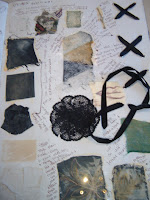
HOW TO...IMPROVE MY CHANCES IN GCSE ART AND DESIGN
WHAT DOES THE EXAM BOARD EXPECT TO SEE?
It is important to remember that the exam board won’t expect to see reams and reams of mediocre work.
They do, however expect you to produce a good deal of:
Investigations into a number of areas within your theme
Links with Artists, Art groups or an Art theme
Experiments with a wide variety of Media.
Planning for your final piece.

You should use your ‘project check sheet’ to ensure you have covered all aspects within the set project. It is, however, only a basic guide and only a minimum requirement.
WHAT CAN I DO OUTSIDE OF MY ART LESSON?
There is plenty that you can do outside of you normal lesson to help to increase your grade.
Once you have produced your (extensive) mind map you will then be able to collect images related to the themes within it; see How to create initial ideas at GCSE & AS/A2.
When you collect images you should use as many different sources as you can these may include:
Magazines and newspapers
Your own photographs; see Year 7, 8 & 9 Art Photo's or Year 10 GCSE Sculpture Photos Manipulated!!!
Magazines and newspapers
Your own photographs; see Year 7, 8 & 9 Art Photo's or Year 10 GCSE Sculpture Photos Manipulated!!!
Sketches from observation (these can be quick sketches, but are very important in you sketchbook).
Annotations / your thoughts and ideas about your work and the images you have (these could be of other artists as well)
Song lyrics / poems / short essays; see Gustatory , Start , home , seismic , Sigur Ros or me me me me me me me
Observational work will not only build up your skills but will also add to the information you can use later on.
HOW SHOULD I USE MY SKETCHBOOK?
REMEMBER your sketchbook is your visual note pad.
The exam board want to see that you use it in a PERSONAL way and your sketches are simply there for information; see GCSE AO3- testing out different media
Annotations / your thoughts and ideas about your work and the images you have (these could be of other artists as well)
Song lyrics / poems / short essays; see Gustatory , Start , home , seismic , Sigur Ros or me me me me me me me
Observational work will not only build up your skills but will also add to the information you can use later on.
HOW SHOULD I USE MY SKETCHBOOK?

REMEMBER your sketchbook is your visual note pad.
The exam board want to see that you use it in a PERSONAL way and your sketches are simply there for information; see GCSE AO3- testing out different media
DON’T spend a lot of time making sure your sketchbook work looks lovely, save that for when you produce your final piece. You will get more marks for variety of information and ideas than you will for presentation at this stage. See: Year 10 Still Life Clay Tiles or Year 10 Students Sketchbook Work Scanned & then Manipulated!
Fill your pages with information – white space sticks out like a sore thumb
As you work it is important to go back and look at what you have done and use the images and ideas you thought of earlier- e.g. use specific vocabulary, check out: RedRagGallery (tells you what all those art words mean)
MAKE SURE YOU ANNOTATE YOUR WORK AS YOU DO IT.
HOW MUCH DO I NEED TO DO?
You should produce as much as you need to allow you to consider a variety of ideas later on. The simple rule is – if you can’t think of ideas go back to your earlier work and do more (mind map, mood board, observational sketches etc.)
The percentage of time you spend on your work should be the same as all subjects. Art is, however, one subject you can consider all the time so take your sketchbook (or at least an A5 sketchbook) and camera with you wherever you go. If you can take other media, better still!
WHO CAN HELP ME?
Any member of the Art team will be willing to help and advise you with your work.
There will be extra sessions at lunch time and at the end of the day for you to do guided work, although you are always welcome to work in the Art rooms if you arrange it with your teacher. Your mentor can give you advice on planning and pacing yourself.
Although they may not be great artists your parents can still help in many ways.
They can:
Understand the exam board requirements by looking at the mark scheme and / or the exam board website (we use OCR).
Encourage you to work to the project checklist, and a little more.
Take you to places of interest / galleries / exhibitions etc
WHEN DO I NEED TO FINISH MY PROJECT?
Your teacher will take you through each project in certain stages so that you finish by the deadline date. Your teacher can give you these dates.
You should endeavour to keep on track. If you feel you are falling behind you must tell your teacher immediately.
HOW CAN I PREPARE FOR THE EXAM?
You should consider your exam as your fourth and final project. It will constitute 40% of your final grade so it is important that you make the right choices early on.
You will get your exam paper at the end of February or early March.
As you work it is important to go back and look at what you have done and use the images and ideas you thought of earlier- e.g. use specific vocabulary, check out: RedRagGallery (tells you what all those art words mean)
MAKE SURE YOU ANNOTATE YOUR WORK AS YOU DO IT.
HOW MUCH DO I NEED TO DO?
You should produce as much as you need to allow you to consider a variety of ideas later on. The simple rule is – if you can’t think of ideas go back to your earlier work and do more (mind map, mood board, observational sketches etc.)
The percentage of time you spend on your work should be the same as all subjects. Art is, however, one subject you can consider all the time so take your sketchbook (or at least an A5 sketchbook) and camera with you wherever you go. If you can take other media, better still!
WHO CAN HELP ME?

Any member of the Art team will be willing to help and advise you with your work.
There will be extra sessions at lunch time and at the end of the day for you to do guided work, although you are always welcome to work in the Art rooms if you arrange it with your teacher. Your mentor can give you advice on planning and pacing yourself.
Although they may not be great artists your parents can still help in many ways.
They can:
Understand the exam board requirements by looking at the mark scheme and / or the exam board website (we use OCR).
Encourage you to work to the project checklist, and a little more.
Take you to places of interest / galleries / exhibitions etc
WHEN DO I NEED TO FINISH MY PROJECT?
Your teacher will take you through each project in certain stages so that you finish by the deadline date. Your teacher can give you these dates.
You should endeavour to keep on track. If you feel you are falling behind you must tell your teacher immediately.
HOW CAN I PREPARE FOR THE EXAM?
You should consider your exam as your fourth and final project. It will constitute 40% of your final grade so it is important that you make the right choices early on.
You will get your exam paper at the end of February or early March.
You will have 12 different starting points (or project titles) and you are to choose one of these.
You will have 6 School weeks to collect information, investigate Artists / styles of Art, experiment with media, develop your ideas and plan for your final piece.
At the end of the 6 weeks you will have a 10 hour exam to produce your final piece.
What you need to do is make sure you are fully aware of what is needed in a project before you receive the exam paper. You should be aware of this by the end of you 3 (final) coursework project.
You will have 6 School weeks to collect information, investigate Artists / styles of Art, experiment with media, develop your ideas and plan for your final piece.
At the end of the 6 weeks you will have a 10 hour exam to produce your final piece.
What you need to do is make sure you are fully aware of what is needed in a project before you receive the exam paper. You should be aware of this by the end of you 3 (final) coursework project.
For direction info' also see: How to...Understand GCSE Exam Art Questions




1 comment:
Casual concurrence
Post a Comment